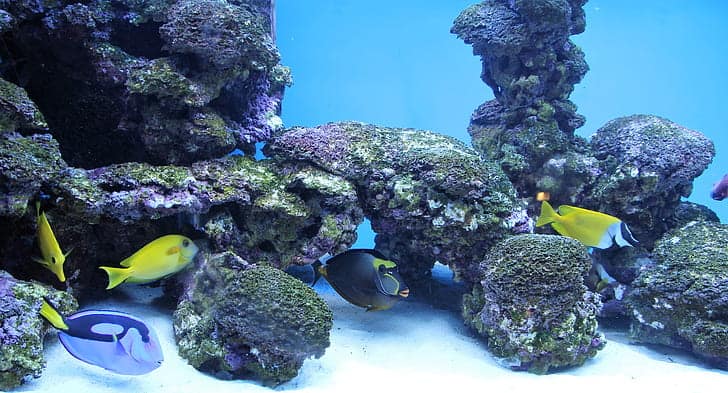A mere nine months after setting up an aquarium–a saltwater aquarium–I realized I was an addict. There is no other term for it, and if you are reading this, you, too, are an addict or are close to becoming one. The beauty of our aquatic charges, the endless joy of discovering new creatures and behaviors in our tanks, and yes, even the mind-boggling and wallet-emptying technical frustrations along the way are all a part of the allure.
It has struck me, though, that the challenges often come close to outweighing the joys. According to Bob Fenner, contributing author for “Freshwater and Marine Aquarium Magazine,” the average experience level of the marine hobbyist is just two years. This means most people throw in the towel long before that. Why is this so? Is the hobby really that difficult? It’s harder than most, for sure, but I don’t think that fully explains the phenomenon. Rather, I think most failures are due to lack of knowledge. The newness of the hobby is partially to blame, as the techniques necessary for a successful marine aquarium are still being discovered and refined. But I also see commercial greed and the easy availability of misguided information as two other major culprits.
The intention of this series of articles is to attempt to counterbalance these forces by sharing my experiences as a beginner in the hobby along with the insights I’ve gained along the way. “Along the way” is a significant phrase because it emphasizes that our hobby is an ongoing adventure, a journey of discovery. How much we discover is a choice left up to us, but I think our enjoyment increases as our knowledge grows. Those who follow their curiosity and learn to think broadly will be rewarded.
“Along the way” is meaningful for another reason: Tao (pronounced like the “dow” in “down”) means “the way” or “the path” in Chinese and refers to the workings of Nature. Its symbol, the yin and yang, represents the harmonious, dynamic balance that exists in the universe. We can peer into our aquariums and see the Tao in action. If we look closely and seek to truly absorb what we observe, we can gain powerful insights into the workings of the Tao that will help us in our hobby and in our lives.
Clearly, as a novice aquarist, I cannot presume to present a treatise on the hobby; but, perhaps, I can begin a discussion that will stimulate some thought and prevent a few of you from making the same mistakes I have. Who knows? You might even learn something about life…along the way.
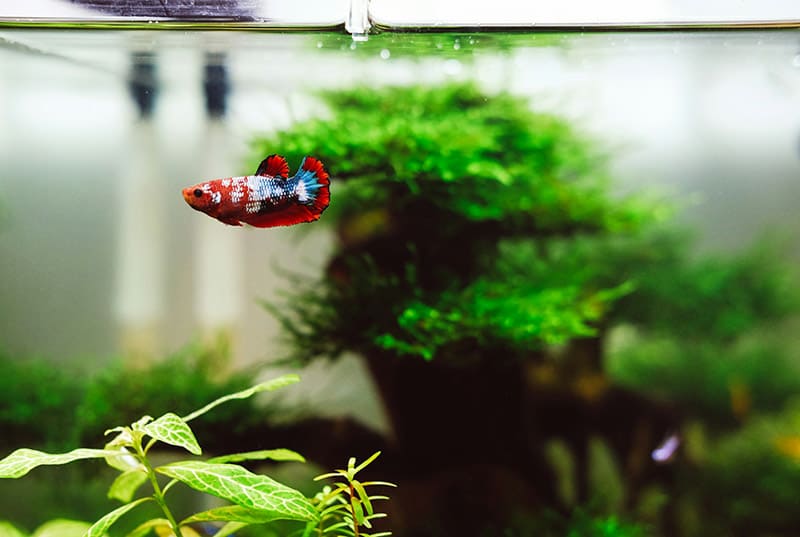
Lesson One: Be Excellent! –Bill and Ted
As the movie characters Bill and Ted counseled from the silver screen, we should do our best at everything we undertake. This applies to life in general and our aquariums in particular, and if I had to pick a single theme for this series, it would be this. The drive to attain perfection is fundamental to the human experience. It’s why we stand in awe of beauty, why we appreciate a smoothly running machine, why we yearn to hear pleasing music over and over again, and even why we comb our hair in the morning. It’s why we feel ill at ease when we disregard our conscience and neglect a necessary chore or act in a way that brings misfortune or grief to another. If we listen, we know intuitively what is right and what is wrong. We know when we are doing everything we can and when we are accepting mediocrity in our performance. It is, perhaps, the single unifying thread of our existence and has fueled the minds of philosophers, spiritualists, artists, and engineers through all time. Why include this in a discussion about marine aquariums? Because, as you will come to find if you fully involve yourself in this hobby, everything is related. One of the wonderful results of this fact is that you can take what you’ve learned in other areas of your life and apply the lessons to your aquarium. Equally, you can, and should, take what you learn in your hobby and apply it in your day-to-day life. One is just a microcosm of the other, and the more fully you recognize this, the richer will be the rewards of your endeavor.
Does this sound too esoteric? Does it fill you with images of trying to drink from a fire hydrant? Then, for now, think only of the section heading: Be Excellent! Do not accept mediocrity in your life or in your hobby. Too much is at stake in both. With time, perhaps as a result of thinking provoked by this series of articles, you’ll come to understand why, and the interconnectedness of things will suddenly make sense. When it does, your enjoyment of the hobby (and life) will blossom.
Lesson Two: Life is Precious–and Expensive
Keeping a marine aquarium is an expensive hobby. Some have experimented successfully with bare-bones “natural” systems, but the key to their long-term success is invariably an extremely low bioload. Most of us, when we close our eyes and imagine our dream aquarium, see an enclosed world teeming with life. If you want to combine the qualities of “enclosed” and “teeming,” you’re going to need some technological assistance, and it doesn’t come cheap. Nor do the costs ever cease; they just slow down in between upgrades and the commencement of new projects. Remember, this hobby is an addiction, and as with any addiction, it’s hard to say “Enough!” and walk away.
This hobby resembles other addictions in another way: lives are affected, sometimes for the worse. Just as we disapprove of couples who bring children into the world that they cannot support, others will rightly disapprove of us if we assume responsibility for the lives of creatures snatched from their homes in the wild only to let them perish in our aquariums. As we disapprove of gamblers who squander their income and can no longer support their families, others (including our families) will rightly disapprove of us if we ignore our financial responsibility to them as we pour more money into our systems and cause our families to suffer. And, as we disapprove of substance abusers who become so entrapped in their addiction that they have no time or emotion left for their families, others (especially our families) will disapprove of us if we spend all of our time with our heads under our tank stands and none nurturing our human relationships.
There are two messages to be taken away from this comparison. The first is, if you can’t afford to do the hobby right (i.e., buy the equipment that will keep both your animals healthy and your maintenance chores at a reasonable level), don’t start. Your tank should not be an acrylic or glass slaughterhouse with a revolving door. It should be a stable, evolving ecosystem where your animals can live and you can enjoy and learn.
The second message is that our hobby should enhance our own quality of life, not undermine it. The keys, in my opinion, to having both a healthy aquarium and a happy home life are these:
- Plan your aquarium carefully to minimize your janitorial duties;
- Spend the [often significant] money on quality equipment to bring the plan to fruition; and
- Police your own behavior to keep your addiction in check. If the system is running smoothly (as it should if you have planned it well), accept it and go relax with your significant other. Don’t obsess, constantly tweak the filters, and neglect your human relationships. If you do, you may find yourself alone with your hobby.
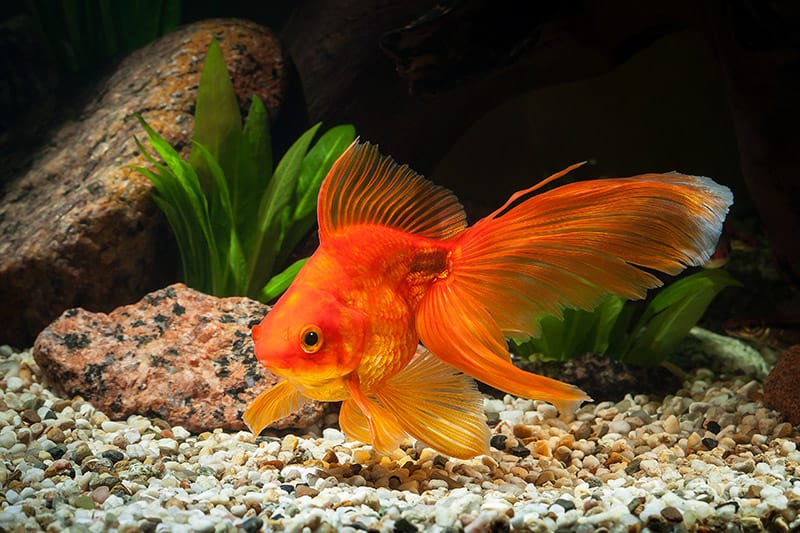
Lesson Three: Relationships Take a Lot of Work
Because our hobby involves living creatures, our involvement in it must entail more than ownership; we must foster a relationship. As with any relationship, it will take a lot of work to make it successful. From the beginning, you owe a debt to your aquatic pets. They have been removed from their natural environment, roughly handled, subjected to the rigors of transport, and stressed by introduction to new surroundings (e.g., aquascape, water parameters, and tank mates) a number of times before they are netted a final time to be brought to your house. If we, as humans, were subjected to the same treatment, few of us would probably survive (read about the African slave trade for proof). And for what purpose? Our enjoyment. Ouch.
Is this an indictment of our hobby and a call for its ban? No. It is a wake-up call to all hobbyists to acknowledge the dark side of the hobby and to understand that responsible care of our fish and invertebrates is a serious responsibility and that our relationship as caretaker should not be taken lightly. This is a hands-on hobby that requires true dedication and an ambition to succeed. It also demands that we learn enough about our animals that we can work with them to maintain their health. If we are successful at keeping them happy and also succeed in learning about their lives and requirements, perhaps contributing to the body of knowledge that will help mankind protect and preserve their species in their natural environment, then maybe we can consider our debt to them repaid. Don’t be a welsher. Put in the amount of work required or get out of the hobby.
Lesson Four: Love Hurts
As in any relationship, loss can be painful. I’ve spoken with dozens of aquarists who, like me, admit to having shed tears at the death of one of their fishes. Virtually all aquarists speak of how they “love” their favorite fish or coral. This is an indication of the depth of their relationship and should be appreciated, not ridiculed. It should also serve to warn us that our hobby has its disappointments and sorrows as well as its victories and joys. Death is an integral part of the experience of life and will come to us all in time. We can learn from the deaths that will inevitably occur in our tanks and grow, or we can let Death beat us by seeing it as only an end and giving up our hobby rather than feel the pain again. Which will you choose?
Love also carries with it responsibilities. Beyond witnessing death, we may have to become unwilling players in the drama from time to time. Our priorities seem clear when we act to wipe out a pest algae or a parasitic infestation to enhance the environment for our other tank inhabitants. Right and wrong become less clear, however, when you have to brutally exterminate a seemingly harmless crab that has started to prevent your corals from opening or has been nipping at your fish as they sleep. Yet your love may drive you to grind the hapless crab into its crevice with a screwdriver (since traps seldom work). Or you may have to euthanize a terminally ill fish (the kindest method, by the way, is to put it in a mixture of one part vodka to four parts tank water). How will you deal with it? Will you learn something of value, or be destroyed emotionally? Or will you ignore the entire event as unimportant? After all, denial ain’t just a river in Egypt.
If you stay in the hobby for any length of time, you’ll have the opportunity to see how you react to death. Don’t trivialize the experience.
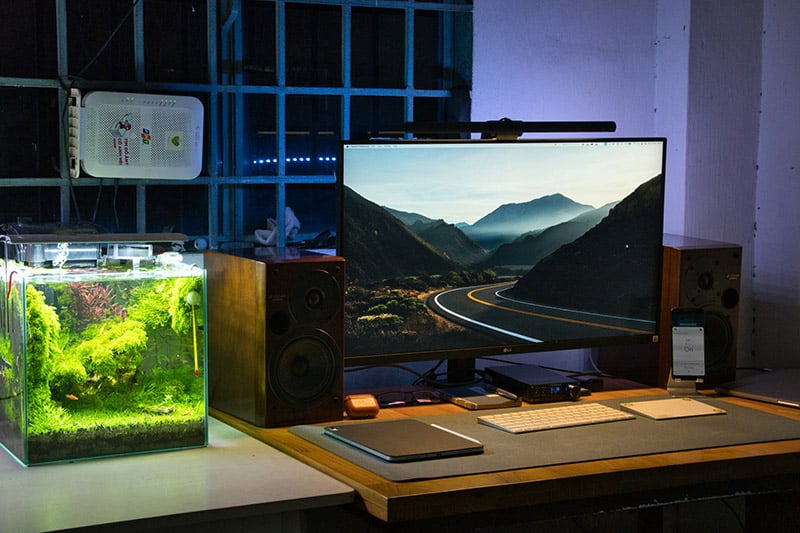
Lesson Five: Life is Tough, But It’s Tougher if You’re Stupid –John Wayne
John Wayne spoke volumes with his simple observation, “Life is tough, but it’s tougher if you’re stupid.” We are fortunate to be hobbyists at a time when the mysteries of how to keep marine animals alive in captivity have been largely revealed and the remaining ones are under close scrutiny by hundreds of professional and amateur researchers. Imagine if you had tried to set up a tank without knowledge of the nitrogen cycle? How many animals would have died of ammonia poisoning before you gave up in frustration? How much money would you have wasted trying snake oils and newfangled gizmos that promised to prolong the life of your fishes? Clearly, knowledge is power and we have all benefited from the lessons learned by those who have gone before us. But there is still much to learn, and none of us should be on the sidelines.
What kind of protein skimmer do you have? Why? Do you understand the principles that make your particular model work? Do you know enough to be able to tell whether your skimmer is really skimming? Do you know what to do if one of your fishes develops lateral line disease? Do you know how to treat your fish for parasitic infestations? If you have a reef tank, do you know how large your corals are apt to grow, what kind of lighting and water motion they require, and what species of fishes to avoid in your system? Would a live-sand substrate work in your aquarium and improve your water quality? Do you know the correct Latin names of every species in your tank so that you can discuss problems without the confusion that common names often cause? If not, what are you waiting for? The lives of your pets depend on your knowledge, and so does your level of enjoyment of the hobby.
The fact that you are reading this article is a good sign. It means that you have gone out into the world to learn more about your hobby rather than leaving your success up to chance or, worse still, trial and error. Have you subscribed to a respectable magazine such as “FAMA?” Have you looked for a saltwater aquarium club in your area? Are you building a library of books on the hobby written by the foremost practitioners of our art? Have you surfed the World Wide Web (WWW) for online resources? Have you joined any Internet aquaria newsgroups? Do you ask questions of every hobbyist and retailer you meet? All of these are potential sources of valuable information. They are also potential sources of dreadful misinformation. Can you tell the difference?
You might be asking yourself what the value is of an article full of nothing but questions. If it convinces you that you don’t know all the answers and need to embark upon an ongoing effort of self-education, the answer is the article is priceless. If I had known more about the unsociable character of damsel fish (Abudefduf and Chromis species) (and the chemical alternative for stimulating the growth of bacteria colonies in a filter), I would never have used them to cycle my tank. If I had known more about lateral line disease when I first brought home a yellow tang (Zebrasoma flavescens), I would have purchased a good vitamin C supplement and provided a better rock for the tang to hide behind instead of rushing into a panicked, retailer-recommended purchase of an inadequate protein skimmer and numerous stress-inducing water changes. If I had known more about the mechanism by which the parasites Cryptocaryon and Amyloodinium spread, I wouldn’t have bought a healthy looking fish from a store that had sick fish in other tanks sharing a single filtration system lacking an ultraviolet sterilizer (UVS). I also wouldn’t have purchased the incredibly overpriced, retailer-recommended UVS that set me back a pretty penny, didn’t cure the problem, and delayed my application of a more sensible treatment. How much time, money, and stress might you have saved yourself if you had known about the simple fixes for these or other problems? How much might you be able to save in the future if you begin reading everything you can get your hands on starting today?
Be inquisitive. Learn as much as you can. Ponder what you encounter until you understand the underlying principles and can apply your knowledge to new problems–and actually employ what you learn. Sometimes we remember having read about the solution to a problem, or even recall the solution itself, but don’t take immediate action. If a pet dies as a result, what good was our knowledge?
Finally, since we are in a hobby where a great many people are constantly working on new solutions to both new and old problems, here is a final admonition: Learn from others’ mistakes; life is too short to make them all yourself.
Lesson Six: Harmony is Hard to Achieve
Harmony, or the peaceful coexistence of multiple entities (people, fishes, natural forces, etc.) is difficult to achieve. If you doubt me, turn on the news. People don’t get along, political parties are constantly scrapping, nations are frequently at war, and species are constantly vying for living space. Though we can’t control most of these conflicts, we can do a lot to foster harmony in our aquariums and thereby improve our little corner of the planet. Just a few of the environmental parameters we can try to balance are living space, the aquascape, tank mates, water quality, and maintenance requirements. The benefits of achieving balance in these areas are many, and, as always, we can see that all of the areas are interrelated and affect one another.
If we don’t overstock our tanks with animals, there will be fewer disputes over territory. This will lower the stress on our animals and contribute to improved health. The strain on our filters will also be reduced, again lowering stress on the animals and also lowering our own stress because our janitorial responsibilities will be lessened.
If we plan our aquascape well, all the fishes will feel secure in a familiar, natural environment, our invertebrates will be able to obtain the levels of water motion and lighting they require, and the water circulation will help remove toxins and detritus from the water leading to better water quality. Our pets will be less stressed, so healthier, which means we won’t have to intervene to treat them. Our filters will be more effective, reducing our maintenance chores and monetary outlay for replaceable media and new filters of greater capacity.
If we choose tank mates carefully, they won’t squabble due to incompatibilities among species or territorial disputes. Less stress means fewer health problems, which leads to fewer human interventions. Fewer health problems can contribute to better water quality (no swimming parasites, for instance), too, so fewer demands for maintenance and new filtration equipment.
Good water quality is achieved through the use of adequate filtration equipment, appropriate stocking levels, well-thought-out aquascaping, and proper maintenance procedures. Water quality is a major factor in determining the health of your pets, so it is a major factor in determining your success as an aquarist and the amount of time you will spend treating sick fish and messing around with filters.
Finally, good maintenance procedures will increase the carrying capacity of your tank, guide you in the design of your aquascape, improve water quality, and reduce the amount of time you spend maintaining the tank. The less you have to disturb the fish with maintenance, the less stressed out they’ll be, leading to improved health, still better water quality, and still less need for human intervention.
Are you getting the picture yet? Do you see the web of interdependencies that is woven inside your aquarium? Is the concept of the Tao beginning to make sense? And can you now begin to see that the interrelatedness of things extends beyond the confines of your tank? If so, you have begun your trek along “the path” and you will never see things the same way again.
What’s the key to establishing all of the balances we’ve discussed? Plan, plan, plan! Plan what kind of tank you want (all fish, invertebrates only, or mixed reef) and what size you want and can afford. Plan what animals you want and can accommodate (don’t try to keep incompatible animals in the same tank, and remember that your animals will need room to grow). Plan your aquascape to meet the needs of your chosen animals (e.g., don’t neglect to give a shy fish places to hide, and don’t fill up the whole tank with live rock if it won’t leave active fish enough water volume to swim around in). Plan your filtration and lighting systems so that you can meet the biological needs of your animals and minimize the maintenance requirements (advanced planning will also reveal whether you will be able to afford the system you are envisioning or whether you need to scale back your aspirations). Lastly, plan your maintenance procedures. By that I mean think long and hard about how much work you are willing to do for your hobby. In many cases, the higher the quality of a piece of equipment, the higher the initial investment; but that investment can radically reduce the future demands on your time. Ask yourself, “How little work can I afford to do?” If the answer is “not enough,” you might consider another hobby before you waste a lot of money or kill a lot of animals.
How do you learn enough to do all of this planning? By reading everything you can get your hands on, talking to everyone who will listen, and seeing as many aquarium setups as you can. In other words, before you can plan, plan, plan, you have to learn, learn, learn. Remember the previous lesson: Life is tough, but it’s tougher if you’re stupid.
See? Everything is interconnected.
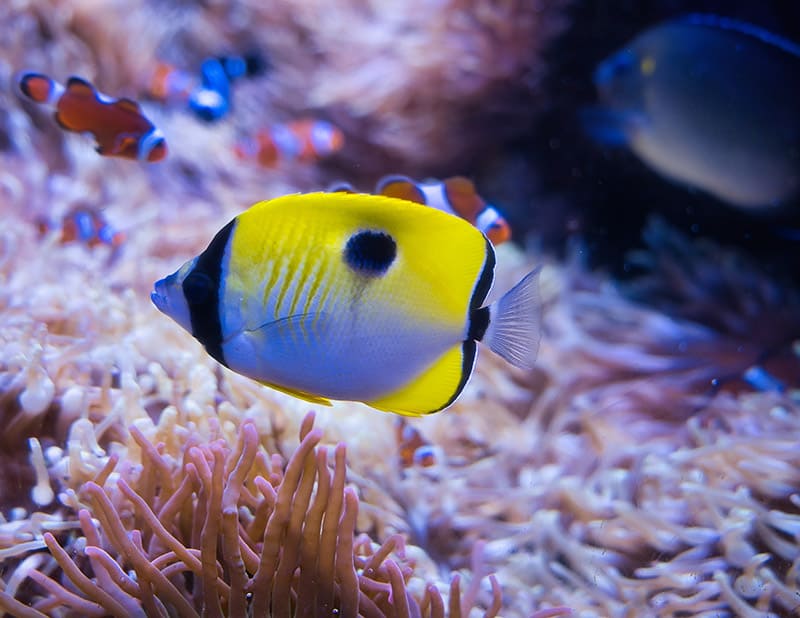
Lesson Seven: Only Bad Things Happen Fast
Most people are familiar with Murphy’s Law: Anything that can go wrong, will go wrong. I propose a corollary for the marine aquarium hobby–Only bad things happen fast. Here is some of my supporting evidence. It can take hours to fill a tank with water, but only seconds for a leak to destroy your living room. It takes weeks to establish a good biological filter, but only seconds to destroy it with a freshwater rinse or incautious application of an antibiotic. It takes months or years to establish a healthy and stable ecosystem in your aquarium, but only seconds to introduce an unquarantined fish infested with parasites. See my point?
Part of the seasoning process for new marine aquarists is coming to grips with the fact that Murphy will always be your silent partner. That doesn’t mean we have to make things easy for him, though. By relying more on unfailing physical principals (like gravity) and less on machinery (like pumps), by depending more on Mother Nature (as in using live rock) and less on technology (like fancy external biological filters), by maintaining proper vigilance, and by practicing emergencies, we can make Murphy work for the entertainment he enjoys at our expense.
Patience is one of the “good things” that doesn’t happen fast. To do things right, you have to increase your knowledge, plan carefully, and implement accordingly. Expecting to start from scratch and set up an aquarium over the weekend is a recipe for disaster. Are you going to do your biological filtration inside or outside of your tank? If the power goes out, where will your biological filtration be in relation to your metabolizing fish? If you have a sump and the power goes out, where will the water go? Where will it go when the power comes back on? How about when a big piece of your tang’s lettuce breaks free and drifts against your overflow? If you haven’t taken the time to play and practice this “What if?” game, and then taken steps to prevent the resultant disasters, you’re making it too easy for our friend Murphy.
Don’t slap your system together. Design it and then implement the design. Build in redundancy and buffers. Assume the worst and practice what you can (like simulating a power outage once a week, at a minimum). Observe your system carefully, getting to know its quirks and personality. Know the warning signs of misbehaving equipment and of animals in the early stages of disease. And always act quickly to correct things gone awry, because the only thing faster than the advent of a bad situation is a bad situation going from bad to worse.
Editor’s Note:
Thanks to Adam Whitlock for allowing me to republish his work. I did nothing to it except reformat it into HTML. Look for more lessons from Adam Whitlock in an upcoming issue.
Featured Image Credit: PickPik
